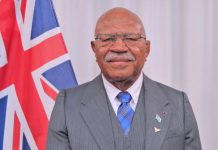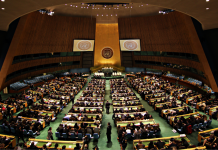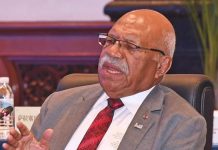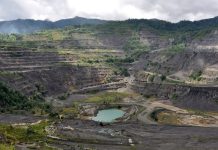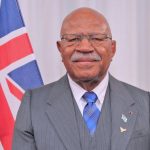New Zealand expressed renewed concern on Monday about the Cook Islands’ prime minister travelling to China this week to sign agreements without properly consulting with Wellington despite the two nations’ constitutional ties.
New Zealand has become increasingly cautious about China’s growing presence in the Pacific region and the potential threats it poses to the country’s national security.
Prime Minister Christopher Luxon said on Monday at a press conference New Zealand expected transparency and consultation with Cook Islands after its prime minister, Mark Brown, announced that he was heading to China seeking a partnership in national development including infrastructure, trade and the economy.
The Cook Islands is a self-governing country in free association with New Zealand, which provides budget support and commits to defend the South Pacific nation, whose people are New Zealand citizens.
“Under our constitutional arrangements, we expect, you know, matters of defence and security to be transparently discussed between partners. That’s all we’re asking for here,” PM Luxon said.
He said once New Zealand knew what was in the proposed partnership, the government would respond.
China did not confirm the visit, but its foreign ministry on Monday called the Cook Islands an important partner in the South Pacific.
“China believes that New Zealand and the Cook Islands are both important partners of China,” ministry spokesperson Guo Jiakun told a news briefing, adding that China’s ties with the Pacific nation are not aimed at any third party.
New Zealand has repeatedly asked the Cook Islands to consult on the contents of agreements that Brown plans to sign with China but has not received a proper response, deputy prime minister Winston Peter’s office said in a statement on Sunday.
“To those who suggest that our engagement with China is somehow secretive, I reject that completely,” Brown said in a video statement on Cook Islands Television News Facebook page on Friday, without providing specifics on that engagement.
“Every agreement we enter into will be in the best interest of the Cook Islands,” he said.
Cook Islanders have also questioned secrecy around the agreement. Tina Browne, leader of the opposition Democratic party, told New Zealand-based radio station 531pn that people were concerned about the lack of consultation firstly about a proposed Cook Islands’ passport and then about the agreement with China.
“If there is nothing to hide, why are we not consulting with New Zealand?” Browne said.
Australia, New Zealand and the U.S have been moving to counter China’s growing strategic and diplomatic influence in the past three years by striking agreements with nations, including Tuvalu, Nauru and Papua New Guinea, aimed at shoring up their status as the region’s primary security partners.
However, this latest dispute has shaken confidence in that progress. New Zealand controlled the islands until the 1960s and the tiny territory — with a population of just 15,000 — is one of its closest allies in the Pacific.
“After this, people will be scratching their heads and asking what are all these other agreements worth?” said Mihai Sora, director of the Lowy Institute’s Pacific Islands Programme.
The Trump administration’s recent move to freeze U.S foreign aid, a key funding source for health and community projects across the region, showed that China was “pushing on an open door” in increasing its Pacific influence, said Sora.
“These type of geopolitical surprises lend credibility to the idea that China is looking to pursue any opportunity to assert itself,” he said.
The details of any agreement between the Cook Islands and China remain unclear. Brown has said the deal would foster co-operation on trade, tourism, renewable energy, agriculture, infrastructure and maritime and ocean developments, including shipping and deep-sea mining.
“I suspect Mark Brown has been pushing deep-sea mining,” said Jon Fraenkel, professor of comparative politics at the Victoria University of Wellington, who noted the potential for the extraction of key metals such as cobalt and copper.



